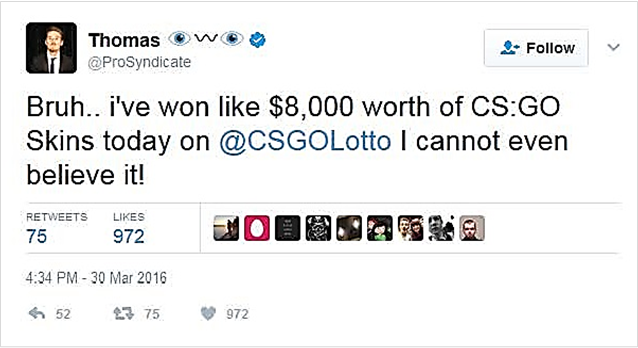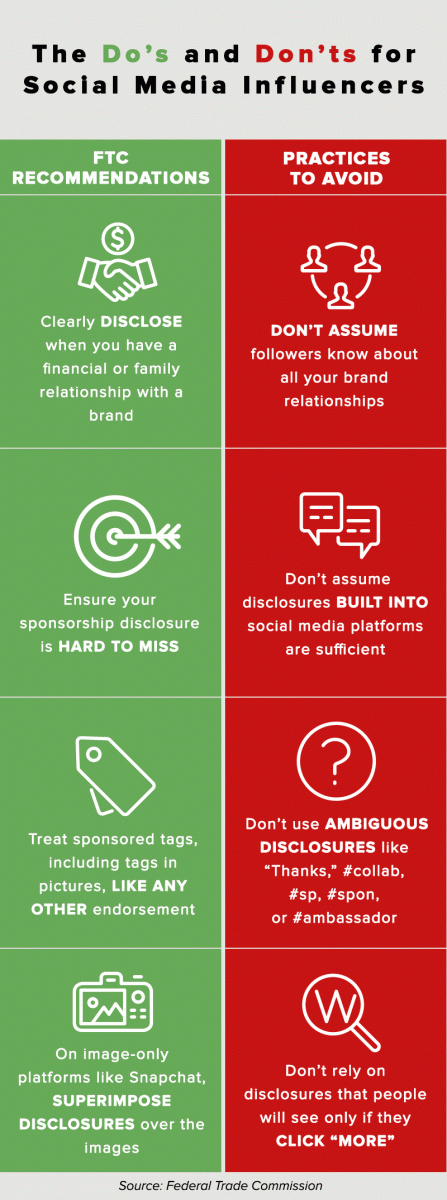If you have any influence over influencers, alert them to three developments, including the FTC’s first law enforcement action against individual online influencers for their role in misleading practices. According to the FTC, Trevor Martin and Thomas Cassell – known on their YouTube channels as TmarTn and Syndicate – deceptively endorsed the online gambling site CSGO Lotto without disclosing that they owned the company.
Law enforcement
Counter-Strike: Global Offensive (also known as CS: GO) is an online, multiplayer, first-person shooter game. “Skins” are game collectibles that can be bought, sold, or traded for real money. Skins have another use: They can be used as virtual currency on certain gambling sites, including CSGOLotto.com. On that site, players could challenge others to a one-on-one coin flip, wagering their pooled skins. In 2015, respondent Martin posted a video touting CSGO Lotto:
We found this new site called CSGO Lotto, so I’ll link it down in the description if you guys want to check it out. But we were betting on it today and I won a pot of like $69 or something like that so it was a pretty small pot but it was like the coolest feeling ever. And I ended up like following them on Twitter and stuff and they hit me up. And they’re like talking to me about potentially doing like a skins sponsorship like they’ll give me skins to be able to bet on the site and stuff. And I’ve been like considering doing it.
Martin followed up with more videos on his YouTube channel showing him gambling on the CSGO Lotto site. In addition, he tweeted things like “Made $13k in about 5 minutes on CSGO betting. Absolutely insane” and posted on Instagram “Unreal!! Won two back to back CSGOLotto games today on stream – $13,000 in total winnings.”
 Cassell promoted CSGO Lotto in a similar way, posting videos that were viewed more than five million times. In addition, he tweeted a screen shot of himself winning a betting pool worth over $2,100 with the caption “Not a bad way to start the day!” According to another tweet, “I lied . . . I didn’t turn $200 into $4,000 on @CSGOLotto. . . I turned it into $6,000!!!!” Then there’s this one: “Bruh.. i’ve won like $8,000 worth of CS:GO Skins today on @CSGOLotto. I cannot even believe it!”
Cassell promoted CSGO Lotto in a similar way, posting videos that were viewed more than five million times. In addition, he tweeted a screen shot of himself winning a betting pool worth over $2,100 with the caption “Not a bad way to start the day!” According to another tweet, “I lied . . . I didn’t turn $200 into $4,000 on @CSGOLotto. . . I turned it into $6,000!!!!” Then there’s this one: “Bruh.. i’ve won like $8,000 worth of CS:GO Skins today on @CSGOLotto. I cannot even believe it!”
Well, Bruhs, while we’re on the subject of things we cannot even believe, did either of you like consider clearly disclosing that you like owned the company – a material connection requiring disclosure under FTC law?
The complaint also challenges how the respondents ran their own influencer program for CSGO Lotto. They paid other gamers between $2,500 and $55,000 in cash or skins “to post in their social media circles about their experiences in using” the gambling site. However, the contract made clear that those influencers couldn’t make “statements, claims, or representations . . . that would impair the name, reputation and goodwill” of CSGO Lotto. And post they did on YouTube, Twitch, Twitter, and Facebook – in many instances, touting winnings worth thousands of dollars.
According to the FTC, Cassell, Martin, and CSGOLotto, Inc. falsely claimed that their videos and social media posts – and the videos and posts of the influencers they hired – reflected the independent opinions of impartial users. The complaint also charges that the respondents failed to disclose the material connection they had to the company – and the connection their paid influencers had. The proposed settlement requires Cassell, Martin, and the company to make those disclosures clearly and conspicuously in the future. The FTC is accepting public comments about the settlement until October 10, 2017.
An interesting aside: This isn’t the first time Cassell’s name has appeared in an FTC complaint. In a 2015 settlement with Machinima, the FTC alleged that Cassell pocketed $30,000 for two video reviews of Xbox One that he uploaded to his YouTube channel. Although the FTC didn’t sue him, the complaint in that case alleged, “Nowhere in the videos or in the videos’ descriptions did Cassell disclose that Respondent paid him to create and upload them.”
Warning letters
The next development of interest to influencers relates to more than 90 educational letters the FTC sent to influencers and brands in April 2017, reminding them that, if influencers are endorsing a brand and have a “material connection” to the marketer, that relationship must be clearly disclosed, unless the connection is already clear from the context of the endorsement.
21 of the influencers who got the April letter just received a follow-up warning letter, citing specific social media posts the FTC staff is concerned might not be in compliance with the FTC’s Endorsement Guides. But the letters are different this time. The latest round asks the recipients to let us know if they have material connections to the brands in the identified social media posts. If they do, we’ve asked them to spell out the steps they will be taking to make sure they clearly disclose their material connections to brands and businesses.
Updated guidance for influencers and marketers
We’ve also just released an updated version of The FTC’s Endorsement Guides: What People are Asking, a staff publication that answers questions about the use of endorsements, including in social media. The principles remain the same, but we’ve answered more than 20 new questions relevant to influencers and marketers on topics like tags in pictures, disclosures in Snapchat and Instagram, the use of hashtags, and disclosure tools built into some platforms. You’ll want to read the updated brochure for details, but here are four “heads up” points for influencers:
 Clearly disclose when you have a financial or family relationship with a brand. “But everybody knows!” No, they don’t. It’s unwise for influencers to assume that people know all about their business relationships.
Clearly disclose when you have a financial or family relationship with a brand. “But everybody knows!” No, they don’t. It’s unwise for influencers to assume that people know all about their business relationships.- Don’t assume that using a platform’s disclosure tool is sufficient. Some platforms are starting to offer disclosure tools, but that’s no guarantee they’re an effective way for an influencer to disclose a material connection to a brand. Like so many things on social media, it’s all about context. One key consideration is placement – whether the disclosure attracts viewers’ attention, taking into account where people are likely to look on a particular platform. For example, when paging through a stream of eye-catching photos, a viewer may not spot a disclosure placed above the picture or off to the side. The ultimate responsibility for making clear disclosures is yours. That’s why you want to make sure your disclosures are hard to miss.
- Avoid ambiguous disclosures like #thanks, #collab, #sp, #spon, or #ambassador. Clarity counts. When disclosing a material connection to a brand, use language that’s clear and unmistakable. It’s unlikely that abbreviations, shorthand, or arcane lingo will communicate the disclosure effectively to consumers. Think of it like football. Unless the quarterback throws the ball and the receiver catches it, it’s an incomplete pass.
- Don’t rely on a disclosure placed after a CLICK MORE link or in another easy-to-miss location. Consider your own viewing habits on social media. Do you click every CLICK MORE link? We don’t either. When disclosing a brand relationship, the better approach is to hit ‘em right between the eyes. Furthermore, on image-only platforms, superimpose your disclosure over the picture in a clear font that contrasts sharply with the background.
